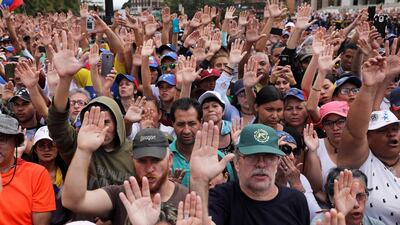In what is shaping to be a global divide over Venezuela, the Trump administration is leading the international campaign against its current embattled President Nicolas Maduro and is considering a new set of options to increase the pressure on his government.
Washington’s decision on Wednesday to back Venezuela’s opposition leader Juan Guaido and recognise him as interim president came as protests grew against Mr Maduro. It crowned a path of tense and hostile relations between the two governments.
The Trump team, for both domestic and external reasons, has been at the forefront of opposition to the Maduro government by issuing threats and sanctions that even targeted his wife Cilia Flores de Maduro over corruption accusations.
Domestically, opposing Mr Maduro will only boost Mr Trump’s credentials among the Venezuelan expatriate community in Florida. Representatives from the swing US state such as Republican Senator Marco Rubio or Democratic Congresswomen Donna Shalala and Debbie Wasserman Schultz have embraced the White House’s policy that sits well with their constituents.
But outside of Florida, Mr Trump’s policy has triggered a divide on the global scale on how to react to the events in Caracas. The decision to back opposition leader Juan Guaido has reproduced a Cold War split.
The protest backers in the West are being led by the US, Canada, France, Argentine, Brazil, and the European Union backing the protesters, while Russia, China, Syria, Iran, Cuba, Bolivia, and the Palestinian Authority are all backing Mr Maduro.
The one exception is Turkey who is today the only Nato member to be supportive of Mr Maduro. Turkish President Recep Tayyip Erdogan called Mr Maduro and urged his “brother to stand tall” and weather the storm.
But, with 13 people killed in two days of protests, and the Trump administration considering more pressure, the situation is likely to intensify rather than calm in the short-term.
US officials on a call with reporters on Wednesday confirmed that the administration is considering a new set of sanctions if the escalation continues. “Frankly, in our sanctions we've barely scratched the surface of what actions the United States can take from an economic sanctions front,” one US official said.
Those could include targeting the currency flow to Mr Maduro, oil restrictions or listing Venezuela as a sponsor of terrorism. Mr Trump said “all options, always, all options are on the table,” but Washington is not seeking the military option now, according to a US official.
Instead a peaceful exit for Mr Maduro is a goal the US has been encouraging. One official said Washington is hoping that Mr Maduro may “seek to accept this peaceful transition and will seek an exit route, a peaceful exit route”.


